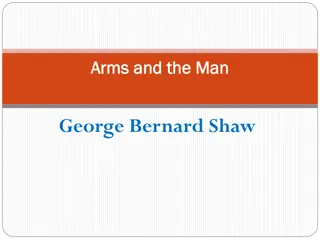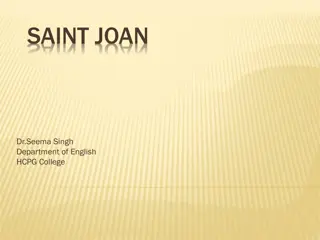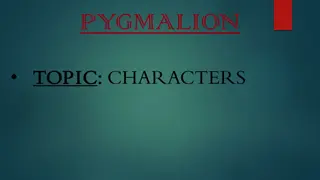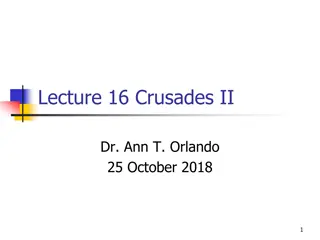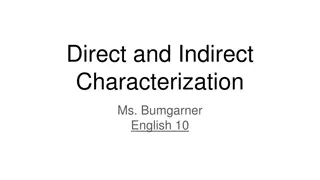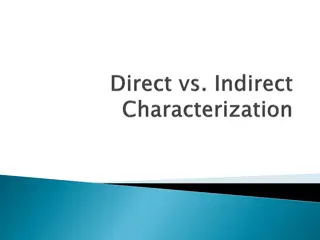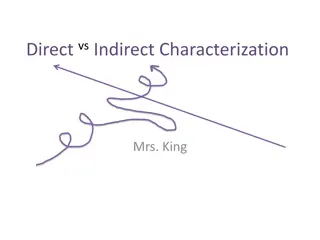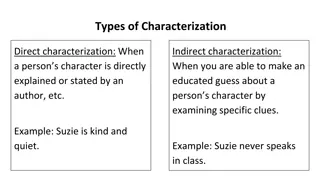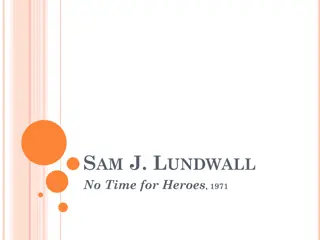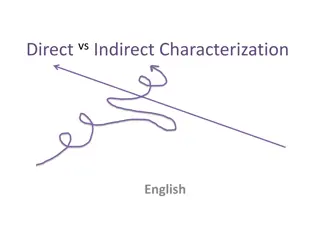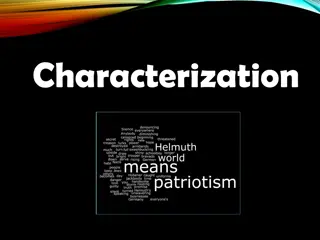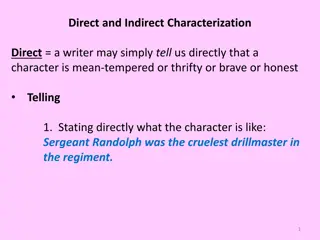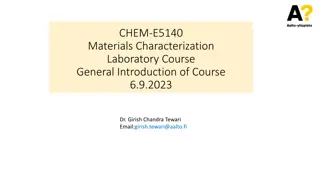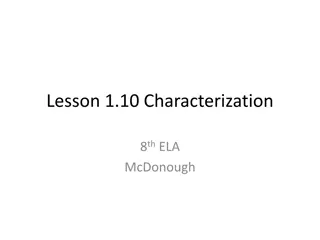Characterization in Bernard MacLaverty's 'The Trojan Sofa' through Niall
In Bernard MacLaverty's "The Trojan Sofa," the character Niall, an 11-year-old boy, grapples with fear, innocence, and a desire for his father's approval as he becomes involved in criminal activities. Niall's internal conflicts, innocence, and entrapment by his father's influence are skillfully portrayed, shedding light on themes of vulnerability, manipulation, and the loss of childhood innocence. MacLaverty delves into the complexity of Niall's character, highlighting his struggles and the impact of his surroundings on his young mind.
Download Presentation

Please find below an Image/Link to download the presentation.
The content on the website is provided AS IS for your information and personal use only. It may not be sold, licensed, or shared on other websites without obtaining consent from the author.If you encounter any issues during the download, it is possible that the publisher has removed the file from their server.
You are allowed to download the files provided on this website for personal or commercial use, subject to the condition that they are used lawfully. All files are the property of their respective owners.
The content on the website is provided AS IS for your information and personal use only. It may not be sold, licensed, or shared on other websites without obtaining consent from the author.
E N D
Presentation Transcript
Bernard MacLavertys Trojan Sofa "The Trojan Sofa" is about a child who acts as a spy and infiltrator for his Catholic burglar dad. It is a complex and delicate mix of a child's vulnerability and a parent's glorification of petty crime as an act of political courage. The key relationship between the father and son could obviously be compared with Father and Son . You could also look at division in society, style, setting, conflict, danger or theme. http://www.youtube.com/watch?v=QH_Vc4fHomE
Background From an interview with MacLaverty: In the story The Trojan Sofa', although there isn't a death, there's a theme which seems to underscore the collection, namely the idea of characters hiding from each other or themselves. Would you agree? The Trojan Sofa' is about a boy who is abused. The father uses him to help rob places. I suppose the story came from Trieste in Italy. My wife and I were there for the James Joyce Summer School and we were given a flat for a couple of days. This woman was showing us around and she said it was hardly worth showing us the keys as they'd rob us anyway. She told us this story about someone who was put inside a piece of furniture which was then sold as an antique with someone hiding inside. I tucked it away in my mind and thought, that's a good story. And then, when some people robbed banks in Belfast of millions of pounds, I thought, well, that'll fit together nicely.
Characterisation Niall Annotate your text and take notes on the following key areas: Personality (and how conveyed?) Views/Beliefs (What are these? Why formed? Consequences/ dangers of these?) Emotions/anxieties (How does he feel and why?) What does MacLaverty reveal through Niall s characterisation? (key themes etc.) Use quotations to back up your views
Characterisation Niall- 11 year old I m not scared just have some what-if knots in my gut. What if they have a dog. Or a burglar alarm with laser beams like they have in the movies. shows he is actually afraid of position he is putting himself in entering Protestant house breaching the void. Suggests all his different fears. Doesn t want to admit them makes them more threatening/ real and also trying to be a brave hard man to emulate his father and make him proud. Obviously wants approval from father. Conveys his sense of entrapment/lack of free-will as he is here, despite his fears. Boy has a childish imagination lasers shows there may still be hope he will get to be a child/innocent. The writer highlights Niall s innocent nature to convey the sadness of how easily this can be sacrificed due to an over- bearing and controlling father. Acceptance of dad s crimes non judgemental - just stating facts as he sees them - Andthat d be my Da clued in. Na ve etc. of what dad is doing.
We know he is a smartboy and MacLaverty here suggests that even the intelligent can not break free from the vicious cycle of violence, hatred etc. Niall cannot form his own views he is controlled/manipulated to share his dad s views. Andit s one up for Ireland sadly already just sees it as a game. He does not take cruelty/revenge against Protestants seriously as he doesn t understand the morality of his actions he is not thinking for himself but is doing his dad s bidding. Conveys how intolerance/prejudice can be spread due to a lack of understanding = MacLaverty s main point. Na ve/innocence stop the exercising the penny drops suggests dad is corrupting him/sacrificing his childhood in the process. Becoming hardened/tough at only 11 Boo-hoo. Lend me a hanky. no empathy/pity for others. Sarcastic tone. Dad doesn t care so son will not care in future: The news is the usual boring stuff. disinterested. he ll be one of ours. divisive casualties on both sides only ones that are relevant are those with same views. Again, like F+S, likely son will become thenews in the future due to his already sectarian views.
It was funny being in a house with Union Jacks and pictures of the Queen on the walls. Really spooky. suggest unease/fear he might be caught/killed fear etc. is hidden by hard front. Misses mother I lie thinking about her for a while The smell of the dust inside the sofa for some reason makes me feel sad. symbolism: thinking about the past/what life used to be like/missing his mother (again could compare with F+S and dad/son s reactions after mother s death.) Suggests no nurturing/protective person in his life so has been brought up in a male-dominated/authoritative environment (father/uncle.) Isolated/lonely Idon t have many friends. They re so stupid playing lost childhood, forced into adulthood prematurely father uses him while he will still fit in to sofas. Will not receive the benefit of his friends views which are likely to be more tolerant/accepting as they are not bitter about the past like father. and I think of myself as a mouse metaphorically suggests his insignificance /vulnerability. Irony = next generation who have the power to make a difference/be more tolerant/accepting but sadly we know this will be impossible here as he has already been corrupted.
Style Narration First person narration told from Niall s pov MacLaverty creates an extremely acute portrayal of a child and although Niall is unaware that father is encouraging him to hate Protestants etc, we know what he is doing is abusive, irresponsible and is teaching a child that it is acceptable to hate people solely based on their religion. Sentences start with conjunctions esp. and typical childlike way of telling a story- natural speech of a child - stream of consciousness constant relay of thoughts etc. To convey his innocence/lack of understanding in what his father is doing and how horrified MacLaverty is that parents have the power to raise their children and have an impact on who they become, but some use this power immorally to manipulate/control their children in upholding their views/beliefs. Short sentences- just states facts not coloured with his own views. Father tells him how to think; he doesn t question this dad head of family to be obeyed (conveys the underlying danger in this r.ship as son is being told how to feel towards Protestants and is too na ve/trusting to question this MacLaverty does this to convey how easily violence/aggression is propagated.)
Lacks focus/easily distracted goes off on a tangent - jumps from one topic to another again typical child I got the highest marks of anybody in Northern Ireland. My Da sells anything and everything Extensive use of parenthesis children tell every minute detail in a story doesn t know what information is important/most relevant similarly cannot filter through advice he receives from dad just accepts it as fact - tells us he is a young boy who should be at home sleeping and not getting involved in hate crimes. Boy will be worried about what may happen to him in the sofa and is also ingraining the Protestant/Catholic divide in his head. The reason MacLaverty uses these stylistic features/narration is to convey the innocence of Niall/childhood and how easily it can be corrupted by the environment he/they grow up in trusts his father, wants to make him proud so does as he asks, unaware he is being indoctrinated to perceive the Catholics as superior and the Protestants as inferior/worthy only of hatred/contempt etc. Conveys key themes corruption of innocence/ consequences of prejudice/intolerance/ complexities of father+son relationship etc.
Admiration for dad Hero worship admiration for a figure we know is manipulating his son, encouraging violence/hatred against British, propagating the divide etc: I ve never been caught before. I have no idea what to do. The only advice I ever heard was my Da s. Whatever you say. Say nothing. But he was talking about guys getting integrated in Castkereagh. Guys getting tortured. Shows damaging nature of their r.ship is focussed on violence/ aggression which is all the dad is teaching his son. The only advice I ever heard was my Da s only person he looks to for advice/direction writer suggests misdirection here. Niall can t possibly form his own opinions when he is told what to think by his father.
Characterisation - Dad Manipulates people including his son to get what he wants e.g. information (at market to obtain info. to rob house), a sense of dominance over Protestants etc. Likes to control people superiority complex, likes to believe he is better than others. The wrong done to this country was so great that we can do anything in retaliation. Emphasising he really does believe the Protestants deserve anything they get there is no limitation to the pain/suffering he feels should be inflicted upon them. Furthermore, the use of direct speech suggests he is recalling his dad s words verbatim and these views are becoming an integral part of his being. Shift from indirect speech to direct speech. Niall s at an age where he trusts everything his dad says doesn t challenge views just accepts them He has very strong views has my Da.
Father has strong views, and he is not afraid of showing these/influencing his son. God-like view of himself/religion Saying this in front of son is misguiding and confusing him. Should stop or will guide his son into wrong type of life. Father is destroying son s future not letting him form his own views/encouraging him to be intolerant/view Protestants as inferior will only lead to more violence/suffering/death. (compare with F+S where father would do anything to get son out of this conflict, here father wants son to be part of it from an early age.) A war is two sides, one against the other, he says. It s as simple as that. - Dad not prepared to understand complexities of war he very much focuses on divisive element of war no in between Protestants are seen as the enemy always suggests why the fighting has perpetuated. Also shows lack of concern/interest these are the lessons he is teaching son.
Father/son relationship Manipulation of son needs to control him I d never force anybody to do something like this never mind one of my own. But I must say it is for Ireland. Convince son he is doing it for his own good and would never make him do something he didn t want to do. Highlights they are related so he can t go against dad s wishes he has no real choice. appeals to son s patriotism he is doing this for his country we know this is untrue he wants to steal and make money, more so he wants to make the Protestants look like fools etc. Ifit s done against the Brits it s OK by him. for Niall to have Dad s acceptance he must share views. Family so important to RC it would bring shame on family to disagree with the father head of household. You re a bit young for this game. Who put you up to this? not mature enough to make own decisions. It is obvious someone has made him do it. Conveys our view we know this is what has occurred.
Inside the sofa the boy thinks about his situation and reflects on the war This must have been what it was like during the war. All the old ones at the stalls talk about during the war; they never stop Key message old ones should stop will spread the hate as they will turn young boy into a racist he will become angry and vengeful towards the Protestants
Style - Symbolism I know there ll not be much turning round in the foreseeable future. as the reader we understand the symbolism of this that this child is trapped in the conflict which shows no sign of ending heightens our sympathy for this boy as he being taught/actively encouraged to hate the British/become hardened. Symbolises no end to the problems- even as a child he realises this. I see myself dreaming in the darkness and then I wake up in the darkness. symbolic of the political situation no hope that it will come to an end soon. Child s growing understanding of the true nature of conflict that it cannot easily be overcome. Also conveys the feeling of loss/confusion this child is trapped in this situation because of his father s beliefs. and went on and on and on. Repetition bored of monotony of situation larger situation political situation suggests no signs of ceasing.
Story of a young Catholic boy stapled into a sofa by his dad to rob the home of a protestant, but when the young boy is caught he must find a way of escaping symbolic of trying to find a way out of the problem, but only listens to dad s advice and therefore can never truly escape. When caught, the boy tells the Major he needs to use his toilet I turn on the tap and wash my hands. It s that soap with the wee label that never goes away. Imperial Leather. The last thing to go is the label. Problems in Ireland have no hope of ending = symbolism of label not going away People are judged solely on beliefs, identity etc. Symbolic of conflict (their labelling as Protestants/Catholics is divisive and cannot be overcome at this stage)
Style - Juxtaposition I Stanley knife my way out and open the door. My Da and Uncle are sitting there smiling. - they are happy that Niall is following their path happy at his violence on Protestants possessions propagating violence in a young impressionable child. Child is already embroiled in violence.
Style - Onomatopoeia connotations with violence Fixated on sounds nervous he will be caught suggests he is fixated on the violence etc. tickety sound bomb etc. clicks roaring Symbolises the violence/aggression going on around him in the city the conflict there is no chance of his escaping impacts on every day life compare with F&S . Suggests how this child has been forced in to a setting of violence and aggression which he cannot possibly break free of. In F+S the son is also trapped in this world due to his feelings of loneliness/ frustration/ bitterness at home, but he does make the choice to become embroiled in this world, whereas Niall is innocent.
Themes Destructive nature of conflict Complex nature of relationships Corruption/loss of innocence Consequences of intolerance/prejudice
Father/son relationship comparison between Father and Son and Trojan Sofa. Ensure you focus on the character/personalities of the two fathers and how they interact with their sons. Areas of agreement Areas of disagreement
Consider the key relationship conveyed by MacLaverty in both Father and Son and TrojanSofa . Identify key areas on which they disagree and/or agree. You should support the points you make by referring to important ideas in the passages. You may answer this question in continuous prose or in a series of developed bullet points. 5
Questions on both passages Consider the relationships between the father and sons in the two stories Father and Son and The Trojan Sofa. Identify key areas of agreement and/or disagreement in their relationships etc. You should support your answer by referring to important ideas in the passage. 5
Marking criteria for 5 mark comparative Reading for U, A and E question. Practice using F&S and TS
The following guidelines should be used: Five marks identification of three key areas of agreement with detailed/insightful use of supporting evidence Four marks identification of three key areas of agreement with appropriate use of supporting evidence Three marks identification of three key areas of agreement Two marks identification of two key areas of agreement One mark identification of one key area of agreement Zero marks failure to identify any key area of agreement and/or misunderstanding of task
N.B. A candidate who identifies only two key areas of agreement may be awarded a maximum of four marks, as follows: two marks for identification of two key areas of agreement a further mark for appropriate use of supporting evidence to a total of three marks OR a further two marks for detailed/insightful use of supporting evidence to a total of four marks
A candidate who identifies only one key area of agreement may be awarded a maximum of two marks, as follows: one mark for identification of one key area of agreement a further mark for use of supporting evidence to a total of two marks
Possible questions Comparative essay on 2 short stories Style Theme Relationship Characterisation Conflict Setting (time/place)
Writers purpose Spend 5 minutes on your own writing a paragraph on why you think MacLaverty writes this story. Remember this needs to go in to your essay to show you are evaluating what the writer is doing and how successful he/she is in doing so.
Comparative question There is sometimes one of these in the Prose options so it is useful to think about how you could approach a question comparing Trojan Sofa and F+S Choose two short stories which approach the same theme in quite different ways. Demonstrate what the theme is and go on to show how their very different approaches contribute to it. Easiest theme to focus on is the complex nature of relationships for this question.
General advice You should focus on techniques used in both stories (e.g. characterisation, style) which you could compare and contrast rather than writing on one story and then the second. Introduction Bernard MacLaverty s stories Father and Son and TrojanSofa, set in Ireland during The Troubles, both focus on a complex relationship between a father and son. The deterioration and fragmentation of the relationship in Father and Son contrasts with the more outwardly positive one in Trojan Sofa where the son however, is unaware of his father s manipulation and indoctrination into prejudice and hate.
Paragraph 2+3 (at least) theme and writers purpose The second line of the question firstly directs you to explain what the shared theme is (Demonstrate what the theme is) so this is what you should do after the introduction. = Complex nature of relationships. Sum up what the complexity in both r.ship is: F+S = loss of mother/drugs/failure to communicate TS = son s naivety in admiring his dad while being unaware dad is manipulating him towards hating Protestants/encouraging prejudice/intolerance and also teaching him crime when fathers should teach children good behaviour etc.)
Writers Purpose MacLaverty uses these 2 stories to convey the complex nature of relationships and danger of miscommunication/lack of communication. Both sons are trapped in their circumstances ( F+S through his own doing and failure to allow his father to help him/save him and TS son cannot escape hatred towards Protestants, as in doing so, he will have been disloyal to father s beliefs/teachings.) Conveys how influential the people in our lives are in building the person we become. Both stories could have more positive relationships where the sons go on to achieve something in their lives e.g. tolerance/ acceptance of others etc. to build a egalitarian society rather than continuing a divisive one.
Paragraphs 3+4 Style Narration and why/how used in conveying complexity of r.ship. F+S use of fragmented narrative/5 narrative voices to convey broken relationship of father and son/lack of communication etc. Father s attempts to sort relationship/barriers son puts up to prevent this. Symbolising division in city with both sides failing to communicate etc. Conveys danger of lack of communication dad desperately wants to help his son have a better future but son won t let him ( I want you to talk, I want to know. ) TS told from perspective of an 11 year old. First person narration used to convey child s innocence/naivety as he fails to comprehend what father is doing (propagating violence in his child) and instead admires him and follows/upholds all of his dad s beliefs as wants to make him proud ( The only advice I ever heard was my Da s .) Highlights their connection whereas F+S highlights the separation but is used to convey the dangerous nature of r.ships persuading someone to do something by appealing to their patriotism/family loyalty. Breeding violence in an impressionable child who will then fail to form his own more accepting view of the world (corruption of innocence). Extremely dangerous and damaging r.ship that one person has so much power over a young child.
Paragraph 5+6 Characterisation F+S writer builds up divide/failure in r.ship between the 2 characters here. Clipped/abusive dialogue, both stubborn, don t know how to talk to each other complete breakdown in r.ship. Father desperately wants to build r.ship with son. Constant use of questions to try and communicate/find out about son to help him again ( I pulled you away from death once). Father devastated/overcome with fear that he will lose his son ( the news has come to my door ) (genuine love etc. for him compared with TS where son is useful in helping dad commit crimes on Protestants.) TS father s joy at son s early interest in violence/compliance (stanley knife/smile). Niall clearly adores his father and so trusts him implicitly and doesn t question what father asks him to do. Father uses this trust and loyalty to manipulate son etc. Father tries to convince son that being prejudiced towards the Protestants = family loyalty/patriotism ( I d never force anybody to do something like this never mind one of my own. But I must say it is for Ireland. ) r.ship = extremely unhealthy. In F+S father wants to create a healthier/more communicative r.ship with son to help him/save his life, here father uses it for his own needs/benefit.
Paragraph 7 Symbolism/Irony F+S previously strong r.ship (blood-knot, shared memories, garden imagery becoming weeds) but breaks down due to son s problems etc. despite the father s desperation to protect his son ( on bended knees I will pray for him to be safe. ) Failure to communicate has lead to a completely disintegrated r.ship between 2 people who have become strangers. Sadness that dad can only become close to son after he dies irony ( Let me put my arm around you ) Although r.ship outwardly looks dysfunctional, 2 parties do care for each other but no longer know how to communicate due to grief/suffering of the past. TS Niall realises, even as a child, he is trapped in the situation as he see[s] [him]self dreaming in the darkness and then [he] wake[s] up in the darkness therefore he can t break free as would be disloyal to father. Although r.ship seems positive/as if father cares for him, he is actually intimidating and controlling his son to follow his lead. Much more dysfunctional r.ship than F+S as father uses his power/authority to corrupt his child s innocence and lead him into dangerous situations, where he could have been killed, due to his own hatred and prejudice towards the Protestants which he wants his son to uphold.
Para 8 = conclusion. Despite the apparent close relationship conveyed in TrojanSofa, it is clear that, although Niall is unaware, the reader is conscious his father is jeopardising his son s future, through his own prejudice. Whereas, Father and Son features a relationship that was once strong but has been ripped apart by grief and a lack of communication; yet, it is clear the father loves his son and wants to keep him safe although he too jeopardises his son s safety by his procrastination/failure to intervene. Pick the areas from the text which you think you could analyse most fully. There are many different areas you could compare from the 2 texts but it will depend on the question which are most appropriate. Remember for all questions you must focus on at least two areas e.g. characterisation, theme, setting, imagery etc.
1. Choose two short stories in which a central character feels threatened or vulnerable. Compare how this situation is presented in each story and discuss which story is more effective in arousing your sympathy for the central character. 2. Choose two short stories in which setting plays an important role in developing your understanding of character and/or theme Which story, in your opinion, is more effective in developing your understanding? Justify your choice by reference to the setting of both stories. 3. Choose two short stories whose openings are crafted to seize the reader s attention. Explain in detail how the impact of the openings is created and go on to evaluate which of the stories develops more successfully from its opening.
Poetry Choose two poems by the same poet which you consider similar in theme and style. By referring to theme and style in both poems, discuss which poem you prefer. Prose Choose two short stories in which aspects of style contribute significantly to the exploration of theme. Compare the ways in which stylistic features are used to create and maintain your interest in the central ideas of the texts.
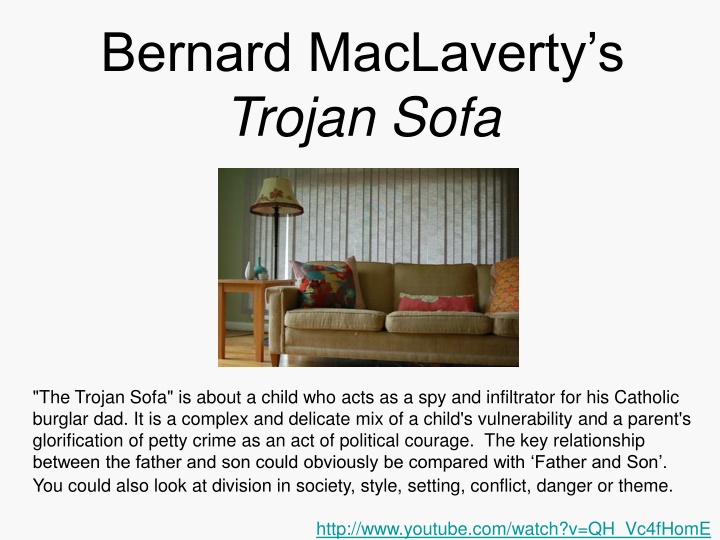


![❤[PDF]⚡ Civil War Talks: Further Reminiscences of George S. Bernard and His Fel](/thumb/20551/pdf-civil-war-talks-further-reminiscences-of-george-s-bernard-and-his-fel.jpg)


